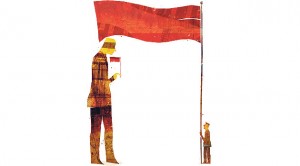 Turkish foreign policy recently intensified its attention on the Arab Spring, carrying out extensive diplomatic efforts to secure an immediate resolution for the turmoil in the region.
Turkish foreign policy recently intensified its attention on the Arab Spring, carrying out extensive diplomatic efforts to secure an immediate resolution for the turmoil in the region.
In addition to developments in the region, the country’s relations with Israel have become part of the daily political agenda due to last year’s assault on the Mavi Marmara. On top of that, Turkey turned its attention to the independence of Southern Sudan to make sure it proceeded in compliance with international law. Lastly, Turkey looked to its east and the impact of the state of war between Russia and Georgia, analyzing the possible outcome thereof for Turkey.
Armenia dealt with all these issues from a different angle, but has kept a close eye on Turkey’s foreign policy. Experts in Armenia have warned politicians to make sure they draft policies addressing the most pressing and probable developments; whether Southern Sudan sets a precedent for the Nagorno-Karabakh region, for instance, or whether the Israeli Knesset recognizes the 1915 incident as genocide. Also, and Turkey may not be aware of this, but the Vatican has commenced a study in which it will document and compile the brutality of the deportation by forced marches and the massacres of the Armenians in the early 20th century, a project that should be completed by 2015. This poses serious challenges for Turkey. It was also announced that information gathered during this process will be publicized through exhibitions and media publications.
Armenian politicians who concretized attempts at rapprochement with the diaspora teamed up with the opposition to create an international commission responsible for the commemoration of the centennial of the Armenian genocide. The activities planned by this commission include political pressure on Turkey to ensure that it clarifies its stance towards the 1915 incidents by 2015. In the initial session of the commission, Giro Manoyan, a member of the Dashnak Party’s political affairs bureau, noted that the matter should be handled from different perspectives and that concrete policies should be drafted to this end. Armenian President Serzh Sarksyan, on the other hand, noted that as people victimized by genocide, they should not ignore the victimizations and pains of other nations and that Turkey’s policy of denial should be addressed effectively. Sarksyan went on to state that international politics should be cleared of such policies.
2015: a common ground for joint action
In addition to the 2015 goals being taken up pretty seriously by the Armenian administration, we also witnessed politicians with a more moderate stance towards Turkey. The 2015 goal merely serves as common ground for joint action. So far, Sarksyan has made frequent calls for the Armenians in the West to invest in his country, but these calls were in vain. In the end, Armenia has been alienated from its region and, as a consequence, it had to seek cooperation and alignment with Russia. From now on, it is imperative for Armenia to establish close relations with Turkey, which does not care for the diaspora at all, and cherish it.
However, the attitudes of nationalist groups that hanged Sèvres maps all around the streets of Yerevan on the 90th anniversary of the Treaty of Sèvres preserve a dual approach. Even Manoyan, with whom I spoke during my visit to his party, now holds moderate views. Noting that relations with Turkey should be improved without preconditions, Manoyan said Armenia has never demanded any Turkish territories so far. He is confident that sincere relations will be established between the two countries. Manoyan also recalled that his party, which traditionally focuses on Eastern Armenians, seeks to gather all Armenians in one single homeland and that his country will make significant progress once the power of elites in Yerevan diminishes. In addition, Manoyan believes that improved relations with Turkey will have a great impact on the growth of national welfare and revenues.
“[The recognition of] genocide is not our priority, but an important matter,” Manoyan concluded.
In an interview with the speaker of the Republican Party, Eduard Sharmazanov, I was told that, as a party, they pay great attention to relations with Turkey, adding that the genocide issue is not their priority but an important matter. He also added that they are ready to hold negotiations and discussions without any prior conditions. Noting that Turkey would do Armenia a great favor if it stays out of the Karabakh issue, Sharmazanov argues that a link between the Karabakh issue and relations with Turkey is not proper and that Karabakh should be liberated and freed.
Noting that there is a lot of work to be done in making progress in bilateral relations with Turkey and that this is indeed a difficult task, Sharmazanov finds Russia’s warm relations with both Azerbaijan and Armenia a reasonable attitude because it is eventually necessary to set a balance in the region. Sharmazanov further notes that preconditions would not help anyone, that the Turkish side has frozen the process [of rapprochement] and that Armenia has picked the easy way out [of rapprochement] by asking for dialogue without any conditions.
The Armenian administration, which has maintained close ties with the opposition and the diaspora, will secure support from a number of influential actors, including the Vatican and Israel, for its goals to be achieved by 2015. Turkey needs to talk directly to Armenia instead of the diaspora to create a common ground and take constructive steps to ensure rapprochement between the sides. In line with Turkey’s vision for 2023 that will ensure domestic development, relations with the neighboring countries should be improved and problems minimized.
Mehmet Fatih ÖZTARSU

 Temmuz 20th, 2011
Temmuz 20th, 2011  oztarsu
oztarsu  Posted in
Posted in  Tags:
Tags: